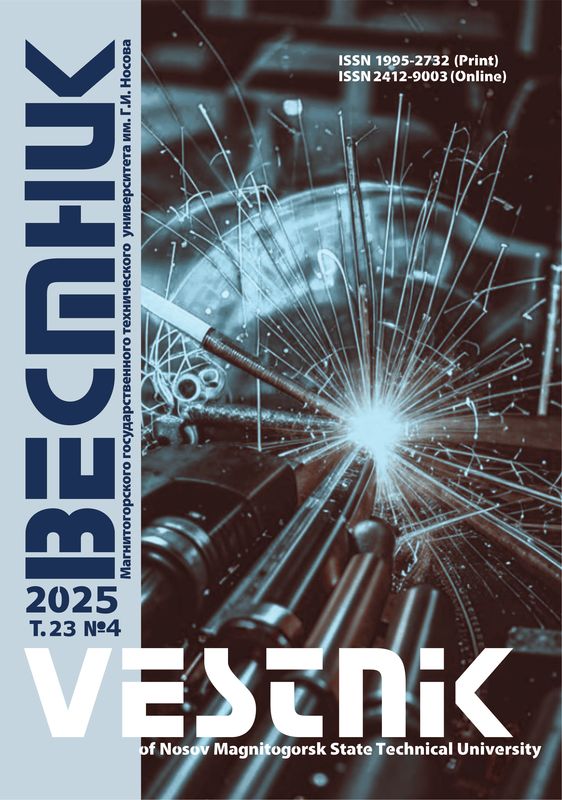DOI: 10.18503/1995-2732-2023-21-2-67-75
Abstract
Audits of the quality management system (QMS) of an organization are important tools for assessing the QMS. Audit interaction distinguishes a group of auditors from a mere collection of people. Therefore, the objectives of studying the interaction among people in a group are relevant for specialists in management. The result of the interaction among auditors is a group judgment (an agreed decision, consensus). The research is aimed at studying peculiarities of reaching an agreed decision in a team of auditors. To achieve the goal, we built a novel theoretical consensus model for a group of loyal and autocratic experts based on the regular Markov chains. To analyze this model, we carried out the simulation for groups of 2, 3, 4, and 5 experts. It was demonstrated for the first time that dynamics of small groups, consisting of 5 experts or less and showing low authority, had a significant specific nature compared with large groups of ordinary experts. It was shown that it was very difficult to reach consensus in dyads (2 people), the time to reach consensus might increase by 10 and even by 100 times or more compared with a group of 5 members. It was revealed that in a dyad of two absolutely loyal experts, consensus was unattainable. This allows us to formulate a practical rule for forming a group of auditors: in conditions of uncertainty, the lower limit of the number of auditors is a triad (three people). The built regression dependencies between the average time to reach an agreed decision and the average authority for groups of autocratic and loyal auditors revealed a fundamental difference in the processes of achieving a group decision in both types of groups: the smaller the size of the group of auditors, the greater the difference between the time to reach consensus in the groups. With an increase in the number of auditors, a delay in the negotiation process may be expected in case of high authority of members; with a decrease in the number of auditors, a delay in making an agreed decision may be predicted for a group of loyal experts. One of the practical recommendations to avoid delaying the agreed decision, which follows from the study results, is to include less autocratic experts, when increasing the number of members in the group, and more autocratic ones, when decreasing the number of members.
Keywords
consensus, audit, group of auditors, simulation, Markov chains, time to reach consensus
For citation
Maksimova O.V., Aronov I.Z. Peculiarities of Achieving Consensus Among a Group of Auditors. Vestnik Magnitogorskogo Gosudarstvennogo Tekhnicheskogo Universiteta im. G.I. Nosova [Vestnik of Nosov Magnitogorsk State Technical University]. 2023, vol. 21, no. 2, pp. 67-75. https://doi.org/10.18503/1995-2732-2023-21-2-67-75
1. Ibragimova P.A., Aliomarova P.A. Audit of quality management systems at an enterprise. Regionalnye problemy preobrazovaniya ekonomiki [Regional Difficulties of Economic Transformation]. 2018;(12):339-346. (In Russ.)
2. Kornilovich V.A., Kholin A.N. Communicative dynamics of small groups: information support for management decisions (on the example of group situational analysis). Kommunikologiya [Communicology]. 2017;5(1):99-110. (In Russ.)
3. Newcomb T. Issledovanie soglasiya. Sotsiologiya segodnya. Problemy i perspektivy. Amerikanskaya burzhuaznaya sotsiologiya serediny XX veka [The study on consent. Sociology today. Difficulties and prospects. American bourgeois sociology of the mid-twentieth century]. Moscow: 1965, 683 p. (In Russ.)
4. Krichevsky R.L., Dubovskaya E.M. Sotsialnaya psikhologiya maloy gruppy: ucheb. posobie dlya vuzov [Social psychology of small groups: study guide for universities]. Moscow: Aspect Press, 2001. (In Russ.)
5. Pochebut L.G., Meizhis I.A. Sotsialnaya psikhologiya [Social psychology]. Saint Petersburg: Piter, 2010, 462 p. (In Russ.)
6. Shapiro S.I. A mathematical model of small groups (Optimal group size). Sotsialno-psikhologicheskie voprosy obshchestvennoy aktivnosti shkolnikov i studentov [Social and psychological issues of social activity of schoolchildren and students]. Kursk: Kursk State Teacher Training Institute, 1971, pp. 38-51. (In Russ.)
7. Polyakova M.A. Features of the use of mathematical models to assess the degree of achieved consensus in the development of standards’ requirements]. Mezhdunarodny nauchno-issledovatelskiy zhurnal [International Research Journal]. 2016;(11(53)):104-109. (In Russ.)
8. Polyakova M.A., Danilova Yu.V. The use of mathematical models, when agreeing upon requirements of standards. Kompetentnost [Competence]. 2016; (9-10(140-141)):68-72. (In Russ.)
9. Gantmakher F.R. Teoriya matrits [Matrix theory]. Moscow: Fizmatlit, 2004, 581 p. (In Russ.)
10. Aronov I.Z., Maksimova O.V. Teoriya konsensusa: uchebnoe posobie [Consensus theory: study guide]. Moscow: MGIMO (U), 2022. (In Russ.)
11. Orlov A.I. Consensus and truth. Zavodskaya laboratoriya. Diagnostika materialov [Industrial laboratory. Diagnostics of Materials]. 2017;83(3):78-79. (In Russ.)
12. Efron B., Tibshirani R. Statistical data analysis in the computer age. Science. 1991;253(5018):390-395.
13. Taleb N.N. Riskuya sobstvennoy shkuroy: Skrytaya asimmetriya povsednevnoy zhizni [Risking your own skin: The hidden asymmetries of everyday life]. Moscow: KoLibri, Azbuka-Attikus, 2022, 384 p. (In Russ.)
14. Myers D. Sotsialnaya psikhologiya [Social psychology]. Saint Petersburg: Piter, 2019, 277 p. (In Russ.)
15. Kerr N.L. Illusions of efficacy: The effects of group size on perceived efficacy in social dilemmas. Journal of Experimental Social Psychology. 1989;(25):287-313.
16. Zazhigalkin A.V., Aronov I.Z., Maksimova O.V., Papic L. Control of consensus convergence in technical committees of standardization on the basis of regular Markov chains model. Springer India: International Journal of Systems Assurance Engineering and Management. 2019;10:29-36. DOI: https://doi.org/10.1007/ s13198-019-00765-1












